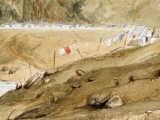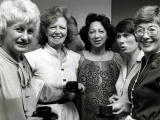657 Battle of Siffin.
811 Battle of Pliska; Byzantine emperor Nicephorus I was slain, his heir Stauracius was seriously wounded.
920 Rout of an alliance of Christian troops from Navarre and Léon against the Muslims at Pamplona.
1309 Henry VII was recognized King of the Romans by Pope Clement V.
1469 Wars of the Roses: Battle of Edgecote Moor – Pitting the forces of Richard Neville, 16th Earl of Warwick against those of King Edward IV.
1581 Plakkaat van Verlatinghe (Act of Abjuration). The declaration of independence of the northern Low Countries from the Spanish king, Philip II.
1745 The first recorded women’s cricket match took place near Guildford,.
1758 French and Indian War: Siege of Louisbourg ended with British forces defeating the French and taking control of the Gulf of St. Lawrence.
1803 The Surrey Iron Railway, arguably the world’s first public railway, opened in south London.
1822 José de San Martín arrived in Guayaquil, Ecuador, to meet Simón Bolívar.
1847 Liberia declared independence.
1856 George Bernard Shaw, Irish writer, Nobel Laureate, was born (d. 1950).
1861 American Civil War: George B. McClellan assumed command of theArmy of the Potomac following a disastrous Union defeat at the First Battle of Bull Run.
1863 – Approximately 25 gold miners died on the Arrow diggings, north-east of Queenstown, as a result of flash floods.

1863 American Civil War: Morgan’s Raid ended – Confederate cavalry leader John Hunt Morgan and 360 of his volunteers were captured by Union forces.
1865 New Zealand’s parliament moved from Auckland to Wellington.
![]()
1875 Carl Jung, Swiss psychiatrist, was born (d. 1961).
1878 Poet and American West outlaw calling himself “Black Bart” made his last clean getaway when he stole a safe box from a Wells Fargo stagecoach. The empty box was found later with a taunting poem inside.
1882 Premiere of Richard Wagner‘s Parsifal at Bayreuth.
1882 The Republic of Stellaland was founded in Southern Africa.
1887 Publication of the Unua Libro, founding the Esperanto movement.
1890 In Buenos Aires, the Revolución del Parque forced President Juárez Celman’s resignation.
1891 France annexed Tahiti.
1894 Aldous Huxley, English-born author, was born (d. 1963).
1895 Jane Bunford, Britain’s tallest-ever person, was born (d. 1922).
1897 Paul Gallico, American author, was born (d. 1976).
1908 United States Attorney General Charles Joseph Bonaparte issued an order to immediately staff the Office of the Chief Examiner (later renamed the Federal Bureau of Investigation).
1909 – Vivian Vance, American actress, was born (d. 1979).
1919 – James Lovelock, English biologist and chemist, was born.
1922 Blake Edwards, American film director, was born.
1925 – Ana María Matute, Spanish author and academic, was born (d. 2014).
1928 Gisborne-born Tom Heeney took on Gene Tunney for the world heavyweight title in front of 46,000 spectators at Yankee Stadium, New York. Although he was defeated, his title bid aroused tremendous interest in both New Zealand and the US.

1928 Stanley Kubrick, American film director, was born (d. 1999).
1928 – Sally Oppenheim-Barnes, Baroness Oppenheim-Barnes, English politician, was born.
1928 – Bernice Rubens, Welsh author, was born (d. 2004).
1936 Mary Millar, English actress, was born(d. 1998).
1936 The Axis Powers decided to intervene in the Spanish Civil War.
1936 King Edward VIII, in one of his few official duties before he abdicated the throne, officially unveiled the Canadian National Vimy Memorial.
1937 End of the Battle of Brunete in the Spanish Civil War.
1939 John Howard, 25th Prime Minister of Australia, was born.
1941 In response to the Japanese occupation of French Indo-China, US President Franklin D. Roosevelt ordered the seizure of all Japanese assets in the United States.
1942 – Vladimír Mečiar, Slovak politician, 1st Prime Minister of Slovakia, was born.
1943 Mick Jagger, English singer (The Rolling Stones), was born.
1944 World War II: Soviet army entered Lviv, liberating it from the Nazis. Only 300 Jewish survivors left, out of 160,000 prior to Nazi occupation.
1944 – The first German V-2 rocket hit Great Britain.
1945 Dame Helen Mirren, English actress, was born.
1945 The Labour Party won the United Kingdom general election of July 5by a landslide, removing Winston Churchill from power.
1945 The Potsdam Declaration was signed.
1945 The US Navy cruiser Indianapolis arrived at Tinian with the warhead for the Hiroshima atomic bomb.
1946 Aloha Airlines began service from Honolulu International Airport.
1947 Cold War: U.S. President Harry S. Truman signed the National Security Act into law creating the Central Intelligence Agency, Department of Defense, Joint Chiefs of Staff, and the National Security Council.
1948 U.S. President Harry S. Truman signed Executive Order 9981 desegregating the military of the United States.
1949 Roger Taylor, English musician (Queen), was born.
1950 Susan George, English actress, was born.
1952 King Farouk of Egypt abdicated in favor of his son Fuad.
1953 Fidel Castro led an unsuccessful attack on the Moncada Barracks beginning the Cuban Revolution.
1953 Arizona Governor John Howard Pyle ordered an anti-polygamy law enforcement crackdown on residents of Short Creek – the Short Creek Raid.
1956 Following the World Bank’s refusal to fund building the Aswan High Dam, Egyptian leader Gamal Abdel Nasser nationalised the Suez Canal sparking international condemnation.
1957 Carlos Castillo Armas, dictator of Guatemala, was assassinated.
1958 Explorer 4 was launched.
1959 Kevin Spacey, American actor, was born.
1963 Syncom 2, the world’s first geosynchronous satellite, was launched from Cape Canaveral on a Delta B booster.
1963 – Earthquake in Skopje, Macedonia left 1100 dead
1964 Sandra Bullock, American actress, was born.
1965 Full independence was granted to the Maldives.
1966 Lord Gardiner issued the Practice Statement in the House of Lords stating that the House was not bound to follow its own previous precedent.
1968 Vietnam War: South Vietnamese opposition leader Truong Dinh Dzu was sentenced to five years hard labour for advocating the formation of a coalition government as a way to move toward an end to the war.
1971 Apollo 15 launched.
1973 Kate Beckinsale, British actress, was born.
1974 Greek Prime Minister Konstantinos Karamanlis formed the country’s first civil government after seven years of military rule.
1975 Formation of a military triumvirate in Portugal.
1977 The National Assembly of Quebec imposed the use of French as the official language of the provincial government.
1984 – Ann Hercus became New Zealand’s first Minister for Women’s Affairs.
1989 A federal grand jury indicted Cornell University student Robert T. Morris, Jr. for releasing the Morris worm, the first person to be prosecuted under the 1986 Computer Fraud and Abuse Act.
1994 Russian President Boris Yeltsin ordered the removal of Russian troops from Estonia.
1999 Cessation of combat activities after the Kargil War; celebrated as Kargil Vijay Diwas in India.
2005 STS-114 Mission – Launch of Discovery, NASA’s first scheduled flight mission after the Columbia Disaster in 2003.
2005 Mumbai received 99.5cm of rain (39.17 inches) within 24 hours, bringing the city to a halt for over 2 days.
2005 Samir Geagea, the Lebanese Forces (LF) leader, was released after spending 11 years in a solitary confinement.
2007 – Shambo, a black cow in Wales that had been adopted by the local Hindu community, was slaughtered due to a bovine tuberculosis infection, causing widespread controversy.
2008 – 56 people were killed and over 200 people were injured in 21 bomb blasts in Ahmedabad bombing in India.
2009 – The militant Nigerian Islamist group Boko Haram attacked a police station in Bauchi, leading to reprisals by the Nigeria Police Force and four days of violence across multiple cities.
2013 – A gunman, Pedro Alberto Vargas, killed six people in Hialeah, Florida, and was fatally shot by police.
2016 – Sagamihara stabbings in Kanagawa Prefecture in Japan in which 19 people were killed.
2016 – Hillary Clinton became the first female nominee for President of the United States by a major political party at the Democratic National Convention in Philadelphia.
2016 – Solar Impulse 2 became the first solar-powered aircraft to circumnavigate the earth.
Sourced from NZ History Online & Wikipedia




 Posted by homepaddock
Posted by homepaddock 























































